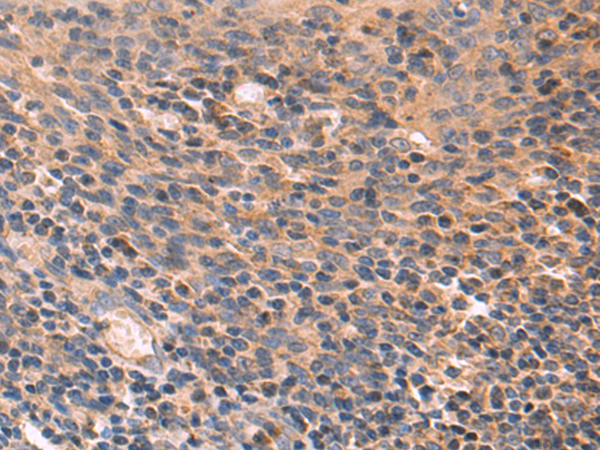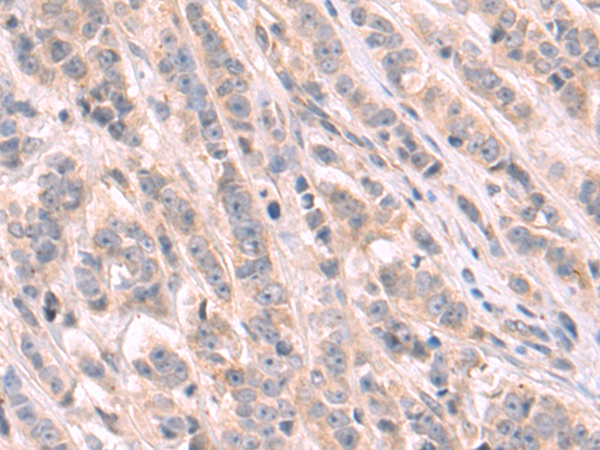

| WB | 咨询技术 | Human,Mouse,Rat |
| IF | 咨询技术 | Human,Mouse,Rat |
| IHC | 1/50-1/100 | Human,Mouse,Rat |
| ICC | 技术咨询 | Human,Mouse,Rat |
| FCM | 咨询技术 | Human,Mouse,Rat |
| Elisa | 1/2000-1/5000 | Human,Mouse,Rat |
| Aliases | HPAP; TRAP; TRACP5a; TRACP5b; TrATPase |
| Host/Isotype | Rabbit IgG |
| Antibody Type | Primary antibody |
| Storage | Store at 4°C short term. Aliquot and store at -20°C long term. Avoid freeze/thaw cycles. |
| Species Reactivity | Human, Mouse, Rat |
| Immunogen | Synthetic peptide of human ACP5 |
| Formulation | Purified antibody in PBS with 0.05% sodium azide and 50% glycerol. |
+ +
以下是关于ACP5(抗酒石酸酸性磷酸酶5型)抗体的3篇文献摘要示例:
---
1. **文献名称**:**"ACP5 as a potential therapeutic target in osteosarcoma: Role in tumor progression and metastasis"**
**作者**:Li Y, et al.
**摘要**:研究通过免疫组化分析发现,ACP5在骨肉瘤组织中高表达,并与患者预后不良相关。实验表明,ACP5抗体抑制肿瘤细胞迁移和侵袭,提示其可能作为治疗骨肉瘤的靶点。
---
2. **文献名称**:**"TRACP5 (ACP5) regulates immune cell function in autoimmune arthritis"**
**作者**:Kimura T, et al.
**摘要**:探讨了ACP5在类风湿性关节炎(RA)中的作用,发现其通过调节破骨细胞活化和促炎因子分泌促进关节破坏。使用特异性ACP5抗体可减轻小鼠模型中的炎症和骨侵蚀。
---
3. **文献名称**:**"ACP5 expression in tumor-associated macrophages promotes angiogenesis and cancer progression"**
**作者**:Wang X, et al.
**摘要**:研究显示,肿瘤微环境中巨噬细胞高表达ACP5.其通过VEGF通路促进血管生成。应用ACP5抗体可阻断该效应,抑制小鼠移植瘤的生长和转移。
---
4. **文献名称**:**"Diagnostic value of serum ACP5 autoantibodies in systemic lupus erythematosus"**
**作者**:Zhang L, et al.
**摘要**:发现系统性红斑狼疮(SLE)患者血清中ACP5自身抗体水平显著升高,与疾病活动度相关。研究支持ACP5抗体作为SLE的新型诊断标志物。
---
以上文献聚焦于ACP5在不同疾病中的生物学功能及抗体应用的潜在价值,涵盖肿瘤、自身免疫病和诊断领域。
ACP5. also known as tartrate-resistant acid phosphatase (TRAP), is a metalloenzyme encoded by the ACP5 gene. It is primarily recognized for its role in osteoclast-mediated bone resorption, where it facilitates the degradation of bone matrix by hydrolyzing phosphate esters in an acidic environment. Structurally, ACP5 exists as two isoforms: a monomeric form (TRAP5a) found in various tissues, including spleen and macrophages, and a proteolytically processed, active dimer (TRAP5b) specifically secreted by osteoclasts. Its tartrate-resistant enzymatic activity differentiates it from other acid phosphatases.
Antibodies targeting ACP5 are critical tools in research and diagnostics. In bone biology, they help identify osteoclasts in histological studies and quantify TRAP5b levels in serum as a biomarker for bone turnover disorders like osteoporosis or Paget’s disease. ACP5 antibodies also have implications in immunology, as ACP5 is expressed in activated dendritic cells and macrophages, potentially linking it to inflammatory or autoimmune conditions. Additionally, elevated ACP5 levels are observed in certain cancers, such as melanoma and leukemia, making these antibodies valuable in oncology research for studying tumor progression or therapeutic targeting. Commercial ACP5 antibodies are typically validated for applications like Western blotting, immunohistochemistry, and ELISA, aiding both mechanistic studies and clinical assessments.
×